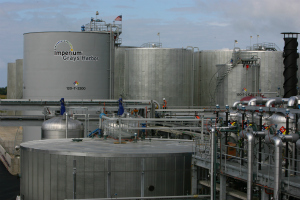Imperium Renewables helping bring biojet fuel to the Northwest



Photo: Imperium Renewables
September 28, 2011
BY Bryan Sims
Seattle, Wash.-based biodiesel producer Imperium Renewables and the U.S. DOE’s Pacific Northwest National Laboratory have reported positive results in a joint development for the production of biomass-based drop-in jet fuel in the Pacific Northwest. So far, according to Imperium, the novel process has produced a meaningful amount of fuel, which is currently being evaluated to determine if it can feasibly be blended into commercial amounts of traditional, petroleum-based jet fuel.
The method being employed in the project between Imperium and PNNL involves using a catalytic process being developed by PNNL, which converts biomass-based alcohols into renewable drop-in jet fuels. Imperium entered into the project in July 2010 through a collaborative research agreement with Battelle, a nonprofit research organization that manages PNNL for the DOE.
The joint project by Imperium and PNNL began with an economic analysis to ensure that the method could be financially viable when it’s fully developed. In the lab, research advanced to bench-scale. The ultimate goal, according to Imperium, is to deploy the process in a commercial facility collocated at the site of its 100 MMgy multifeedstock Grays Harbor biodiesel plant located near Hoquiam, Wash.
The work by Imperium and PNNL is being further developed, led by Roselle, Ill.-based LanzaTech, as part of a recent award from the DOE towards a new biofuel research project. The award leverages approximately $5 million to the integrated technology, which aims to develop a cost-effective technology to produce biobased jet fuel blendstock and biobased products by employing biotechnology and catalysis.
Advertisement
“We’re excited to continue to contribute to the nation’s biofuel efforts through this project and look forward to collaborating with LanzaTech and Imperium,” said John Holladay, energy and environment director for PNNL.
The DOE provided $4 million for the project, about $2 million of which is going to PNNL. The grant is one of three cost-shared projects by the DOE, USDA and U.S. Navy previously announced in August, which invested up to $510 million over the next three years to build or retrofit existing industrial facilities for drop-in advanced biofuel production, such as biojet fuels.
LanzaTech is developing the first half of the process, which converts biomass to intermediates such as alcohols, while PNNL is working with Imperium to convert the alcohols produced by LanzaTech into a renewable drop-in jet fuel. Imperium is also providing in-kind contributions for PNNL’s research and is funding related research at the University of Delaware and Michigan Technological University.
Advertisement
“This grant will help us provide sustainable, economically viable drop-in biofuels that will allow the Department of Defense and the airline industry to become less reliant on foreign oil,” said Imperium CEO John Plaza. “Imperium is excited to be part of this partnership and to continue our work with LanzaTech, Boeing and PNNL to develop renewable jet fuels from multiple feedstocks.”
In addition to Imperium, PNNL and LanzaTech, other participants in the consortium include: The Boeing Co., National Renewable Energy Laboratory, Orochem Technologies and The Port of Seattle.
“We are extremely pleased with the leadership that the President, the DOE, USDA and the Navy have shown by several strong commitments towards the development of advanced biofuels to the aviation industry in the recent months,” Plaza said. “This award and our resulting success will provide additional drop-in fuels to help meet our nation’s aviation fuel needs.”
Upcoming Events





